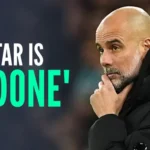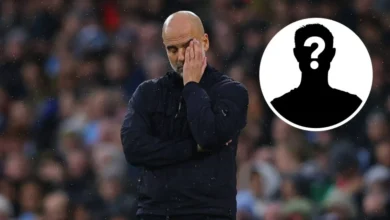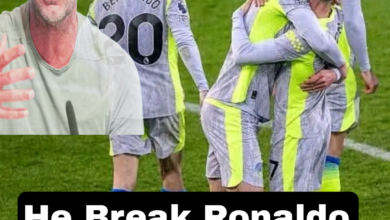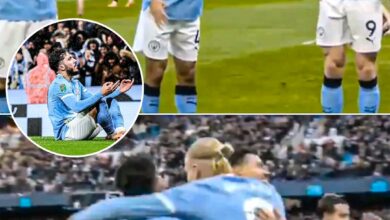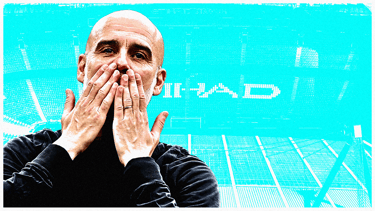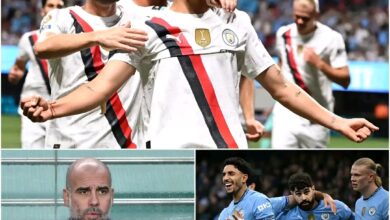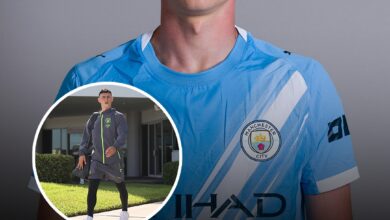Pep Guardiola has been impressed by £53m player and could use him at right-back during the Club World Cup

Manchester City finds itself at a crucial juncture as they navigate the complexities of the 2025 summer transfer window. Under the astute guidance of Pep Guardiola, the club has identified several key areas requiring reinforcement, with the right-back position emerging as a particularly pressing concern. The departure of Kyle Walker to AC Milan on loan during the January transfer window has left a significant void in City’s defensive setup, one that has forced the Spanish tactician to explore innovative solutions while simultaneously planning for long-term stability.
Guardiola’s ambitious plans for the upcoming 2025/26 campaign involve bringing in four to five new faces to bolster his squad’s depth and quality. Among the priority positions, both full-back slots have been earmarked for enhancement, reflecting the manager’s understanding of modern football’s demands on wide defenders. The evolution of the game has made full-backs increasingly vital to tactical systems, serving not just as defensive anchors but as creative outlets and attacking catalysts.
The left-back situation appears to be progressing more smoothly, with Manchester City actively pursuing Wolverhampton Wanderers’ Rayan Ait-Nouri. The club’s approach has been methodical, initially focusing on agreeing personal terms with the player before submitting a formal offer to Wolves. This strategy demonstrates City’s sophisticated transfer methodology, ensuring all parties are aligned before engaging in potentially protracted negotiations with the selling club.
However, the right-back situation presents a more complex challenge. The position has become a source of considerable deliberation within the club’s hierarchy, with multiple factors contributing to the current uncertainty. The ideal candidate must possess the technical ability to integrate seamlessly into Guardiola’s possession-based system while maintaining the defensive solidity required at the highest level of competition.
Fabrizio Romano’s recent insights have shed light on Manchester City’s primary target for the right-back position: Newcastle United’s Tino Livramento. The England international has emerged as Guardiola’s preferred option, representing the perfect blend of youth, experience, and tactical flexibility that the Spanish manager values. Livramento’s development trajectory has been impressive, transitioning from Southampton’s academy product to a key figure in Newcastle’s resurgence under Eddie Howe.
The 22-year-old defender’s attributes align perfectly with Guardiola’s tactical requirements. His pace allows him to cover ground effectively in City’s high defensive line, while his technical proficiency enables him to contribute meaningfully to the team’s build-up play. Furthermore, his Premier League experience eliminates the adaptation period often required for foreign players, making him an immediately viable option for City’s ambitions.
However, Newcastle United’s reluctance to part with their prized asset has created a significant obstacle. The Magpies’ determination to retain Livramento reflects their own ambitions and the player’s importance to their tactical setup. Having invested considerably in their squad transformation, Newcastle is understandably reluctant to weaken their position by selling key players to direct competitors.
The potential unavailability of Livramento has prompted Manchester City to explore alternative avenues, with Juventus’ Andrea Cambiaso emerging as a viable backup option. The Italian international offers a different profile but maintains the versatility and quality that Guardiola demands from his full-backs. Cambiaso’s experience in Serie A and international football provides a solid foundation, though questions remain about his adaptability to the Premier League’s unique demands.
Statistical analysis reveals interesting contrasts between the potential targets. Over the 2024/25 season, Livramento featured in 45 games without scoring but contributing one assist across 3,459 minutes of action. His consistency and reliability have been hallmarks of his performances, making him an attractive proposition for a club seeking stability in the position.
Cambiaso’s numbers tell a different story, with the Italian managing 42 appearances, scoring twice and providing five assists in 2,895 minutes. These statistics suggest a more attack-minded approach to the position, potentially offering Guardiola additional tactical flexibility in his system deployment.
Looking beyond European options, Manchester City has also maintained interest in Flamengo’s Wesley Franca. The Brazilian right-back represents a longer-term investment, offering the potential for significant development under Guardiola’s tutelage. Wesley’s 23 appearances, yielding one goal and two assists across 1,915 minutes, demonstrate his emerging talent in South American football. However, the transition from Brazilian football to the Premier League’s intensity would require careful management and patience.
Closer to home, Tottenham Hotspur’s Pedro Porro has been mentioned as a potential target, though this avenue appears equally challenging. Spurs’ qualification for the Champions League has strengthened their negotiating position, making them less likely to entertain offers for their key players. Porro’s familiarity with English football and proven Premier League credentials make him an attractive option, but the complexities of dealing with a London rival add layers of difficulty to any potential negotiation.
Perhaps the most intriguing aspect of Manchester City’s current situation involves Matheus Nunes, the Portuguese midfielder who has surprisingly impressed Guardiola when deployed at right-back. Following Kyle Walker’s departure, the Spanish manager was forced to seek internal solutions and found an unexpected answer in Nunes’ versatility and athleticism.
The £53 million signing from Wolverhampton Wanderers was initially brought in to strengthen City’s midfield options, but his pace and technical ability have translated surprisingly well to the defensive position. Nunes ranks among the fastest players in the Premier League, an attribute that has proven invaluable when tasked with covering the flanks in Guardiola’s system.
His performances toward the end of the 2024/25 season have been sufficiently impressive to convince Guardiola that Nunes could serve as a viable short-term solution, particularly during the FIFA Club World Cup in America. This tournament presents an ideal opportunity to further evaluate Nunes’ capabilities in the position while providing valuable experience that could inform future tactical decisions.
The Portuguese international’s statistics from the 2024/25 season reflect his adaptability and contribution across multiple positions. With 39 appearances, four goals, and ten assists in 2,680 minutes, Nunes has demonstrated his value as a multifaceted player capable of impacting games in various ways. His assist tally, in particular, highlights his creative abilities and vision, qualities that could prove beneficial when transitioning from defensive to attacking phases.
Guardiola’s willingness to experiment with Nunes at right-back reflects his pragmatic approach to squad management. Rather than rushing into the transfer market with potentially expensive solutions, the manager has explored internal options that might provide both immediate answers and long-term flexibility. This approach aligns with City’s broader strategic philosophy of maximizing existing resources while carefully evaluating external additions.
The Club World Cup represents more than just another tournament for Manchester City; it serves as a crucial testing ground for tactical innovations and player development. Guardiola’s intention to deploy Nunes at right-back during this competition suggests a calculated approach to problem-solving that could influence the club’s transfer strategy throughout the summer.
Should Nunes excel in the right-back role during the Club World Cup, it could potentially reduce the urgency surrounding external signings while providing Guardiola with additional tactical flexibility. The Portuguese international’s success in the position could also create opportunities for rotation and rest for other key players throughout the demanding 2025/26 campaign.
However, the long-term sustainability of this approach remains questionable. While Nunes’ versatility is undoubtedly valuable, asking him to permanently transition from his natural midfield position to right-back could limit his effectiveness in areas where City originally sought his contribution. The club’s substantial investment in the player was predicated on his midfield capabilities, and any long-term positional change would need careful consideration.
The current situation also highlights the broader challenges facing elite clubs in the modern transfer market. The inflation of player values, combined with increased competition for top talent, has made strategic planning more complex than ever. Manchester City’s measured approach to the right-back situation reflects this reality, balancing immediate needs with long-term sustainability.
The financial aspects of Manchester City’s right-back pursuit cannot be overlooked in the current football landscape. The club’s previous investments, including the £53 million outlay for Nunes, demonstrate their willingness to spend significantly on quality additions. However, the current market conditions require careful evaluation of value and potential return on investment.
Livramento’s potential availability would likely command a significant fee, given Newcastle’s strong negotiating position and the player’s age and potential. Similarly, moves for established players like Cambiaso or Porro would require substantial financial commitments that must be weighed against their expected contributions.
The Club World Cup experiment with Nunes represents a cost-effective approach to addressing immediate needs while evaluating long-term solutions. Should this temporary measure prove successful, it could provide City with additional negotiating leverage in the transfer market, potentially allowing them to pursue their targets from a position of reduced urgency.
Guardiola’s tactical system places unique demands on full-backs, requiring them to function as both defensive stalwarts and creative facilitators. The right-back position in City’s setup must provide width in attacking phases while maintaining defensive discipline during transitions. This dual responsibility requires players with exceptional fitness, technical ability, and tactical intelligence.
Nunes’ natural midfield instincts could prove advantageous in this hybrid role, offering a different perspective on positioning and ball progression compared to traditional defenders. His experience in central areas of the pitch provides him with an understanding of passing angles and movement patterns that could benefit City’s build-up play from deep positions.
The Portuguese international’s pace and dribbling ability also align with Guardiola’s preference for full-backs who can beat opponents in one-on-one situations, creating overloads in the final third and providing additional attacking options. These attributes, combined with his proven goal-scoring and assist-providing capabilities, suggest that Nunes could offer a unique dimension to City’s tactical approach
Manchester City’s approach to the right-back situation exemplifies the modern football club’s need to balance immediate requirements with long-term strategic planning. Guardiola’s willingness to experiment with Matheus Nunes in an unfamiliar position demonstrates the innovative thinking that has characterized his managerial career, while the continued pursuit of established targets like Livramento reflects the pragmatic understanding that sustainable success requires proper squad depth.
The upcoming Club World Cup will provide valuable insights into the viability of internal solutions while the transfer window remains open for external additions. Whether Nunes proves to be a revelation at right-back or merely a temporary fix, his versatility has already provided Guardiola with additional tactical options that could prove valuable throughout the demanding 2025/26 campaign.
Ultimately, Manchester City’s success in addressing their right-back concerns will depend on their ability to identify and secure the right player for their specific needs. The club’s methodical approach to the transfer market, combined with Guardiola’s tactical flexibility, suggests that they will emerge from the summer window with a solution that enhances their competitive capabilities while maintaining the financial discipline that underpins their long-term success.
The right-back position may represent a current challenge for Manchester City, but it also presents an opportunity to demonstrate the club’s adaptability and strategic thinking in an increasingly complex football landscape. As the summer transfer window progresses, all eyes will be on how Guardiola and his team navigate these challenges while maintaining their pursuit of excellence on multiple fronts.

